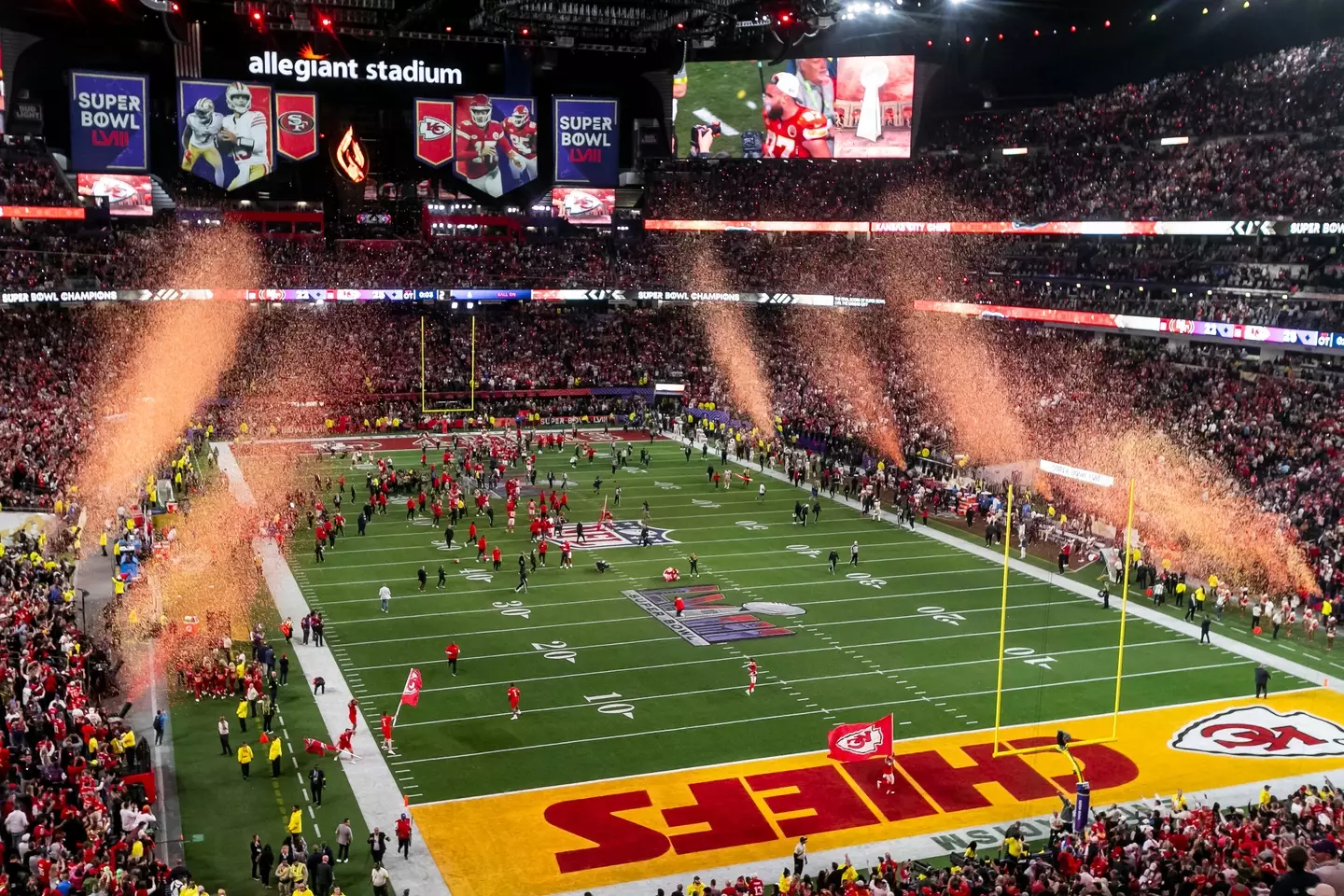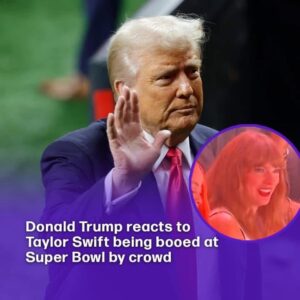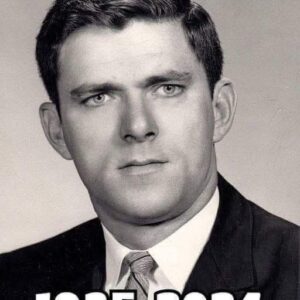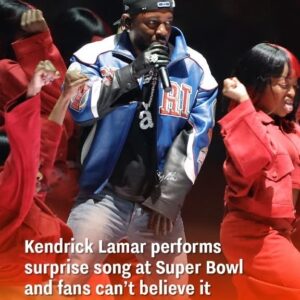This Sunday, February 9, the Kansas City Chiefs will face off against the Philadelphia Eagles in the Super Bowl at the Caesars Superdome in New Orleans, Louisiana. While anticipation for the game itself is at a fever pitch, the excitement off the field has grown even more intense following a controversial decision by the NFL. In a move that has ignited considerable debate, the league has decided to remove the “End Racism” banners, which have long been a symbol of the NFL’s commitment to fighting racial injustice. Instead, the field will display new slogans, “Choose Love” and “It Takes All of Us,” making this the first Super Bowl in four years without anti-racism messaging.
This decision comes at a time of heightened political tension in the U.S., with former President Donald Trump set to attend the game. The change has sparked speculation that the NFL’s actions are influenced by the broader national discussions surrounding diversity, equity, and inclusion (DEI) policies. Trump, a vocal critic of DEI initiatives since his return to the White House for his second term, has consistently advocated for “merit-based” hiring practices.
In this article, we delve into the factors behind the NFL’s decision, explore the political backdrop shaping this moment, and examine the reactions from prominent NFL figures. We also consider the larger implications of this move, particularly regarding the league’s stance on diversity and how sports events can mirror—and sometimes shape—the political climate of the nation.
The Evolving Role of Super Bowl Messaging
The Super Bowl has long been more than just a championship game; it has become a global cultural event that draws attention from millions around the world. Over the years, the NFL has used this massive platform to promote messages of social progress, unity, and inclusivity. One of the most visible symbols of these efforts has been the “End Racism” banners that appeared in the end zones. These banners acted as a powerful call against racial discrimination, reinforcing the league’s commitment to creating a more inclusive society.
However, the NFL’s recent decision to replace these banners with the new slogans “Choose Love” and “It Takes All of Us” marks a significant shift. According to sources familiar with the league’s decision-making, this change goes beyond just an aesthetic update; it reflects a response to the current political environment. A report by The Athletic suggested that the removal of these messages could be a “response to the political climate,” as the nation’s ongoing debates on divisive issues influence high-level decisions.
The Political Backdrop: Trump’s Influence and the DEI Debate
At the center of the controversy is the broader debate over diversity, equity, and inclusion (DEI) initiatives in the United States. Since returning to the White House, Donald Trump has been an outspoken critic of DEI policies, advocating for a merit-based system and challenging what he views as an overemphasis on identity over individual achievement.
With Trump set to attend the Super Bowl—a first for a sitting president—the NFL finds itself walking a fine line. The presence of such a polarizing figure has brought additional scrutiny to the league’s decisions, leading many to question whether the removal of the “End Racism” banners is an attempt to prevent further controversy in an already tense political climate.
Despite these shifts, NFL Commissioner Roger Goodell has maintained a firm stance on the league’s commitment to diversity. In a statement issued earlier this week, Goodell reiterated the NFL’s dedication to social progress. “We started our diversity efforts because we believed it was the right thing to do for the National Football League,” he said. “We’re going to continue to push forward because not only do we believe it makes the NFL better, but we’ve also proven that it resonates with our fans, our communities, and our players.”
Goodell’s comments suggest that while the league may be adjusting to the current political atmosphere, its core values remain unchanged. He emphasized that the NFL’s diversity initiatives are a key part of its identity and success, even as it navigates the intersection of politics and sports.

The NFL has chosen to remove the ‘End Racism’ banners from the Super Bowl end zones (Nick Tre. Smith/Icon Sportswire via Getty Images)
The Rationale Behind the New Super Bowl End Zone Messages
NFL spokesperson Brian McCarthy provided further clarity on the reasoning behind the change in the end zone messaging at this year’s Super Bowl. McCarthy explained that the decision to replace the “End Racism” banners with “Choose Love” and “It Takes All of Us” comes, in part, as a response to the series of tragedies that have recently impacted the United States. These include the New Orleans truck attack, the destructive Los Angeles wildfires, and a tragic collision between an American Airlines flight and a military helicopter on January 29.
“These are trying times, and the nation has endured significant loss and sorrow,” McCarthy told The Athletic. “We believe these new messages are a fitting tribute to the country’s resilience. They aim to uplift, acknowledging the pain while celebrating unity and strength.”
However, this change has not been without controversy. Critics argue that replacing long-standing symbols such as the “End Racism” banners risks diluting the powerful message they conveyed, especially during a time when racial injustice remains a critical issue. Some also feel that while the new slogans promote positivity, they do not carry the same direct call to action that “End Racism” represented.
Trump’s Attendance and Increased Security Measures
Adding complexity to the situation is the confirmed attendance of former President Donald Trump at the Super Bowl, making him the first sitting president to do so. His presence has prompted the Secret Service to ramp up security measures. “Given that this is the first time a sitting president will attend the event, we’ve implemented additional protocols,” said Anthony Guglielmi, a spokesperson for the Secret Service.
Trump’s attendance is expected to draw significant media coverage, potentially influencing how the game is perceived. His well-known opposition to diversity and inclusion policies, along with his political views, has intensified the already polarized climate surrounding the event. For many, his presence raises questions about the role of politics in major sports events and whether the NFL’s messaging changes are a direct response to his influence.
Diverging Opinions: Perspectives from the NFL and Beyond
The decision to remove the “End Racism” banners has sparked a range of opinions within the NFL community and beyond. Some view the change as a pragmatic response to the nation’s collective grief, while others believe it signals a retreat from the league’s stance on combating racial injustice. These differing views underscore the ongoing debate about the role of sports organizations in addressing societal issues.
Supporters of the NFL’s decision argue that updating the end zone messaging acknowledges the challenges the nation has faced, offering messages of unity that transcend political divides. They contend that “Choose Love” and “It Takes All of Us” are inclusive and inspirational phrases that resonate with fans from all walks of life.
On the other hand, critics worry that removing the “End Racism” banners at a time when racial issues remain a focal point of national conversation could send the wrong signal. For many, those banners were more than just a visual element; they were a clear stand on an issue that demands attention. Changing them, some fear, might be interpreted as a weakening of the NFL’s commitment to fighting racial inequality.
In this context, NFL Commissioner Roger Goodell’s ongoing support for diversity efforts becomes crucial. His public reaffirmation of the league’s dedication to social progress is an attempt to bridge the gap between conflicting opinions and assure fans that, despite changes in messaging, the core values of the NFL remain steadfast.
The Larger Picture: Implications for the NFL and Society
The controversy surrounding the Super Bowl’s end zone messages is more than just a discussion about the design of the field. It is a reflection of broader cultural and political tensions that are playing out across the United States. Sports, particularly the Super Bowl, have long been seen as a microcosm of the country’s values and struggles, capturing both triumph and hardship.
For the NFL, this decision highlights the delicate balance the league must strike between inclusivity and the ever-shifting political landscape. Sports organizations are increasingly finding themselves caught in the crossfire of political debates, and the NFL is no exception. The league’s ability to create a welcoming atmosphere for fans while also navigating politically sensitive issues is more important than ever.
The NFL’s actions in this situation could have long-lasting consequences for its reputation, particularly as social media magnifies every choice the league makes. While the new slogans are meant to promote healing and unity, they also risk alienating fans who see the “End Racism” banners as a symbol of real progress and accountability.
Moreover, this debate raises important questions about the role of corporate and institutional messaging in times of national crisis. As the U.S. grapples with natural disasters, political unrest, and social challenges, symbols like these often become rallying points. Whether the new slogans will achieve their intended goal or deepen existing divisions remains to be seen.
Final Thoughts
The decision to replace the “End Racism” banners at the Super Bowl is a multifaceted issue that underscores the intersection of sports, politics, and social responsibility. While the new messages “Choose Love” and “It Takes All of Us” are intended to foster unity and collective healing, they have sparked intense debate about the NFL’s commitment to addressing systemic racism. Ultimately, this controversy reflects the broader cultural and political struggles shaping American society today.





